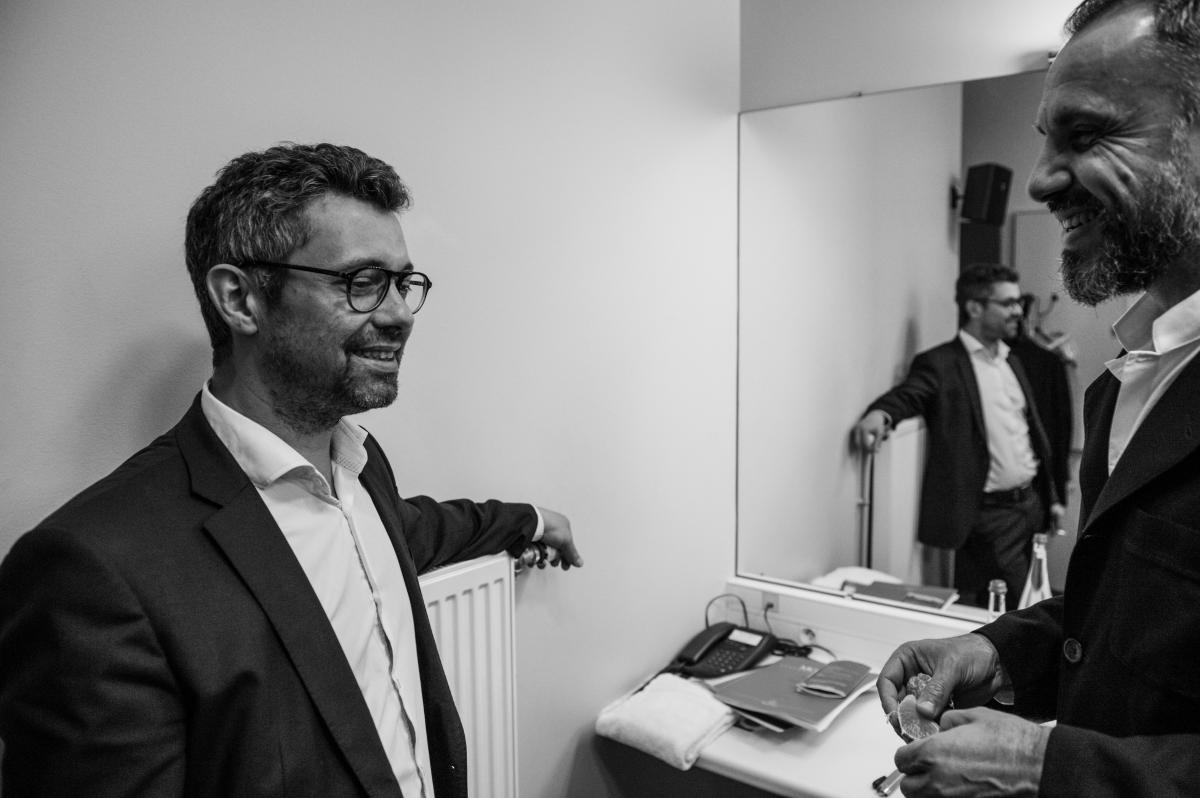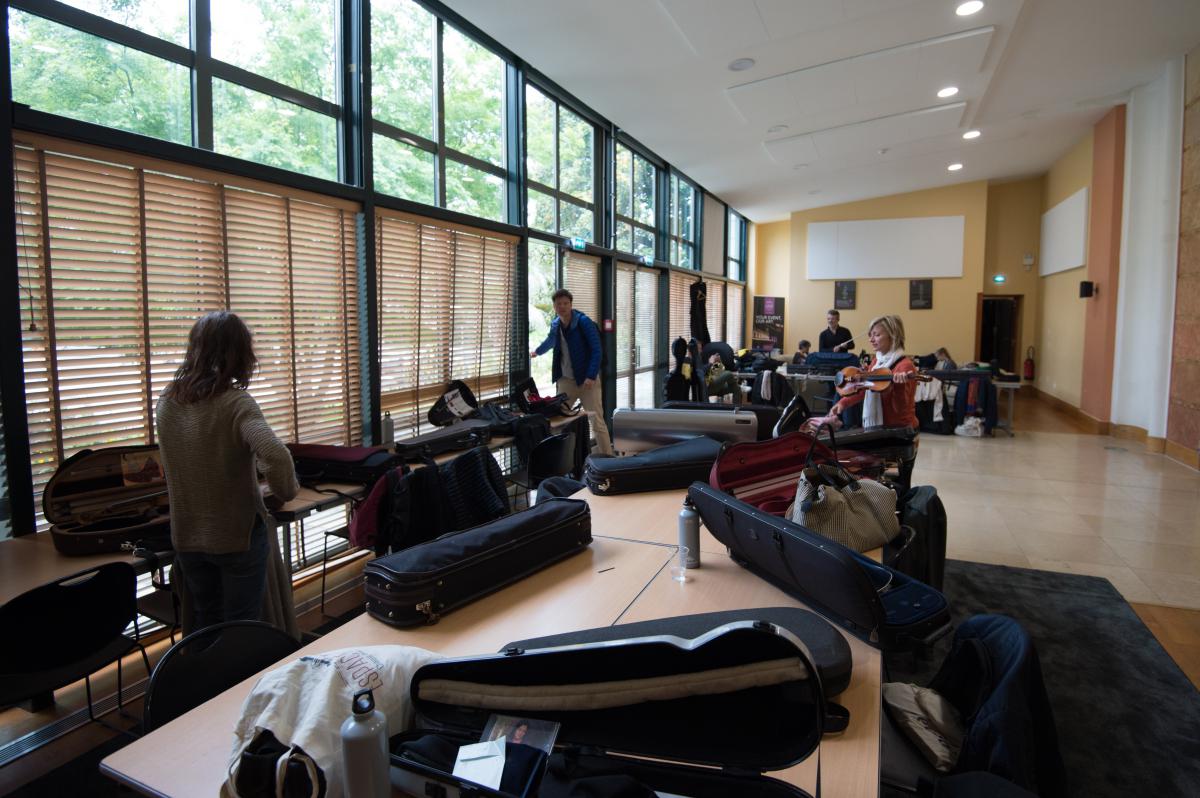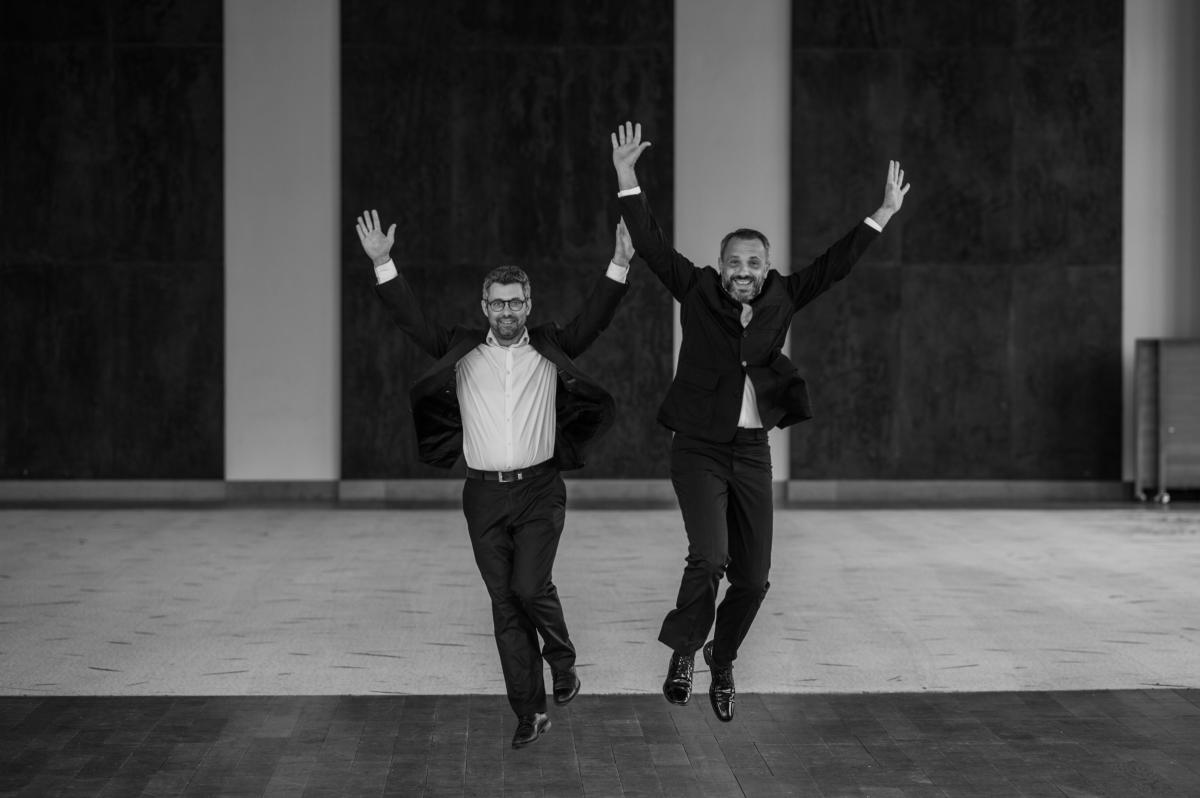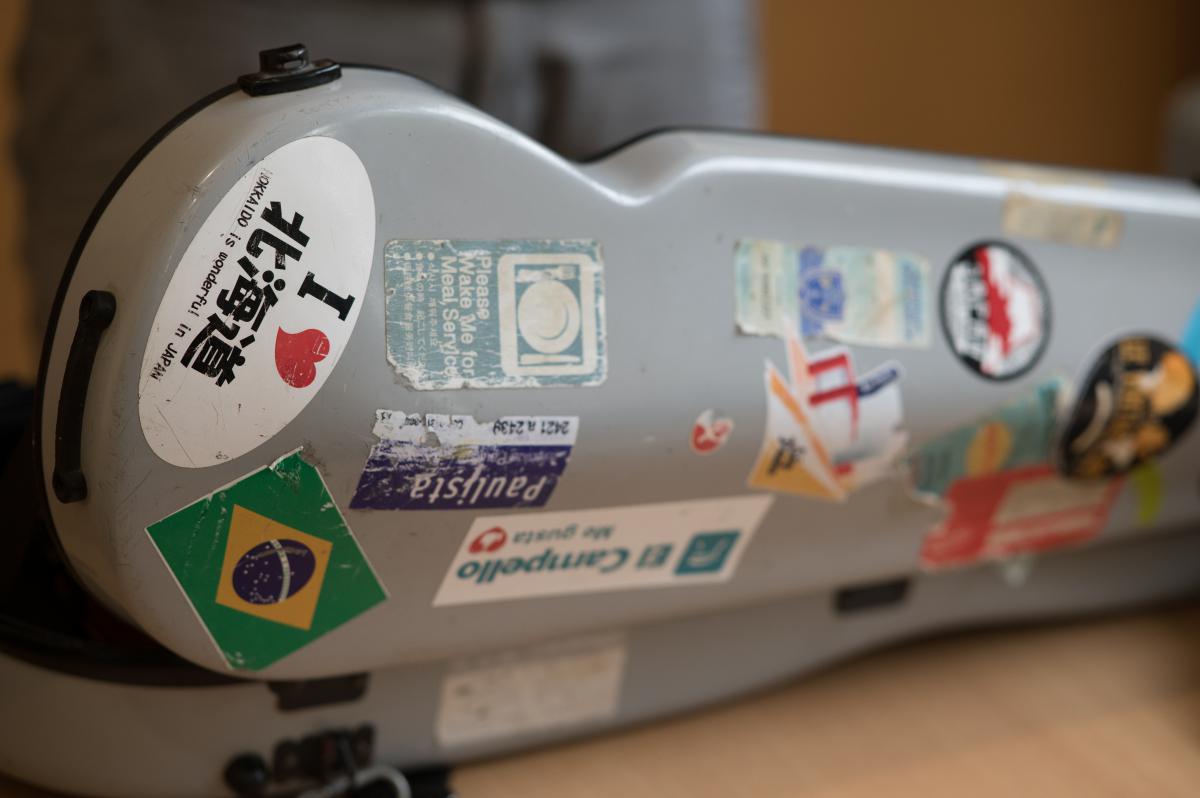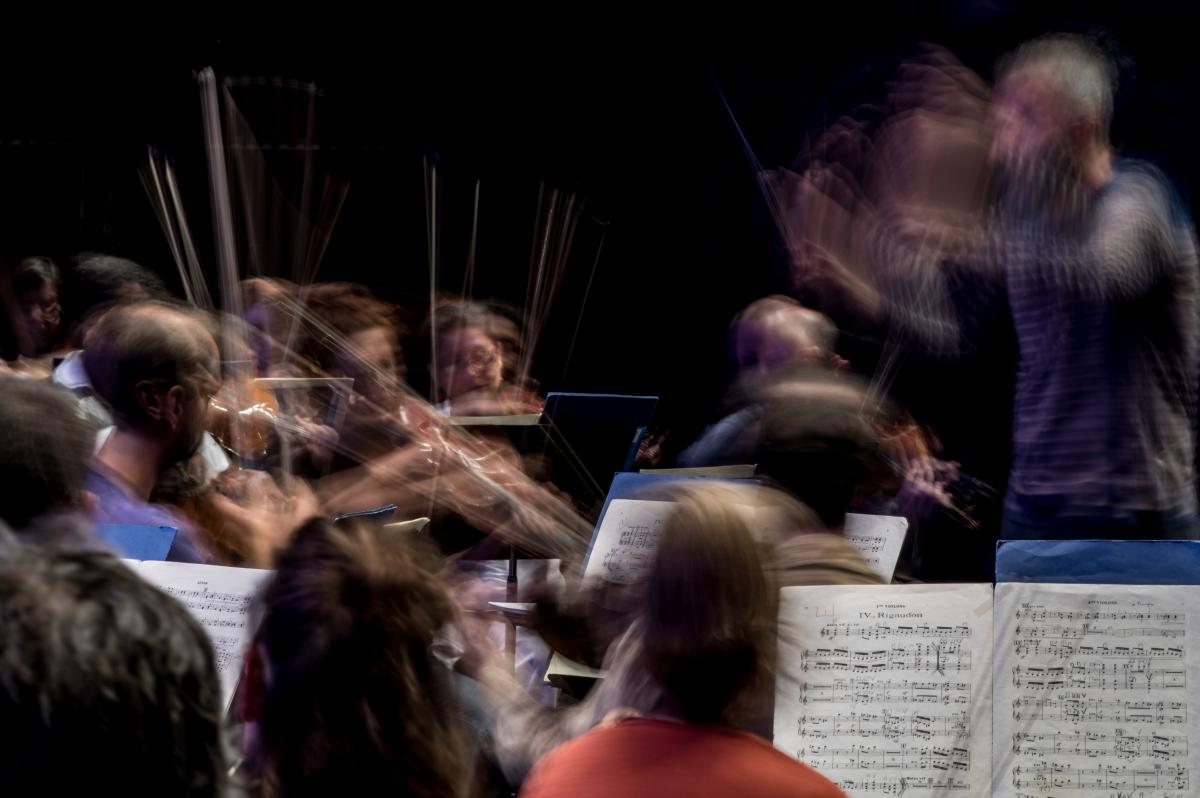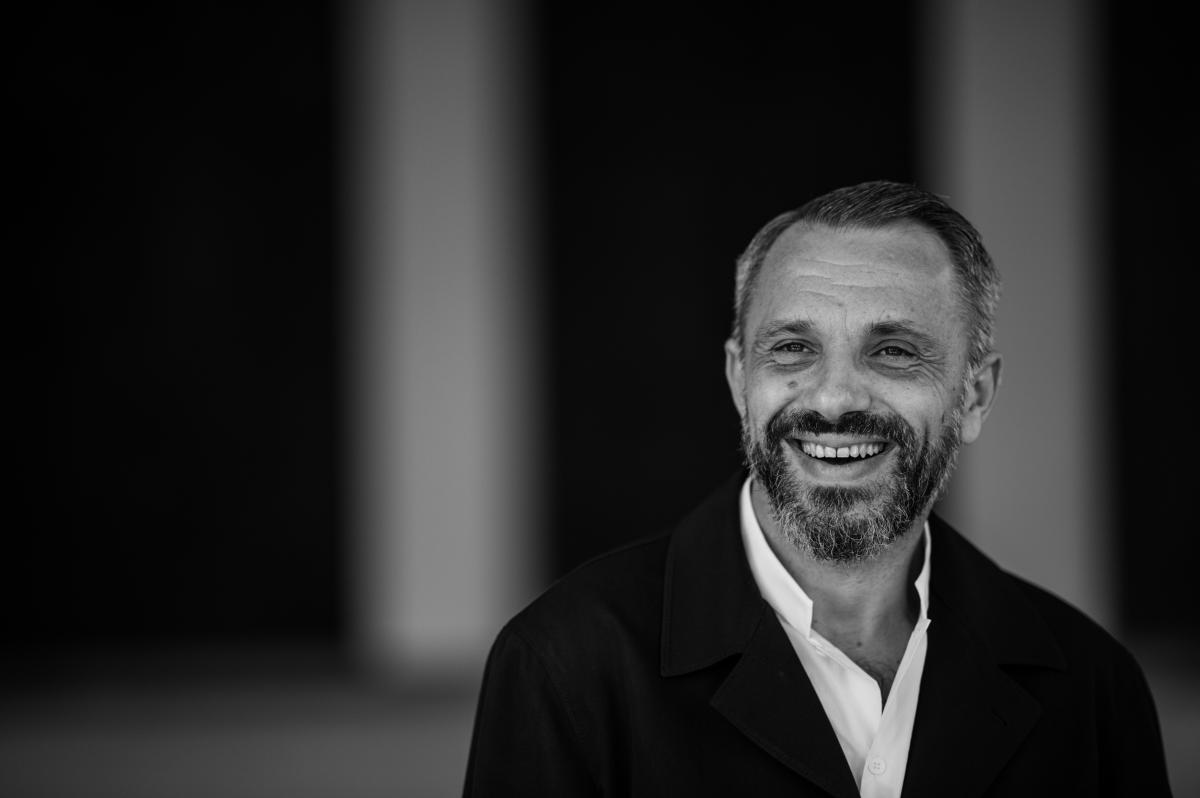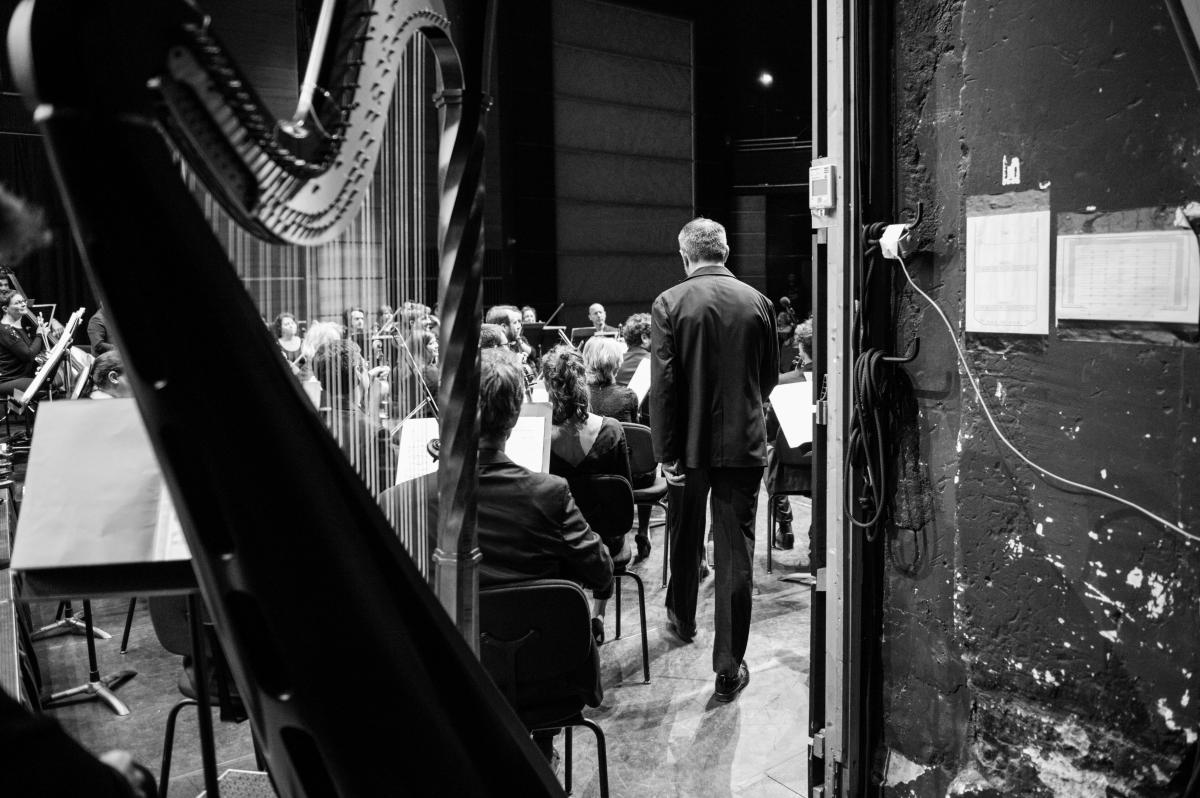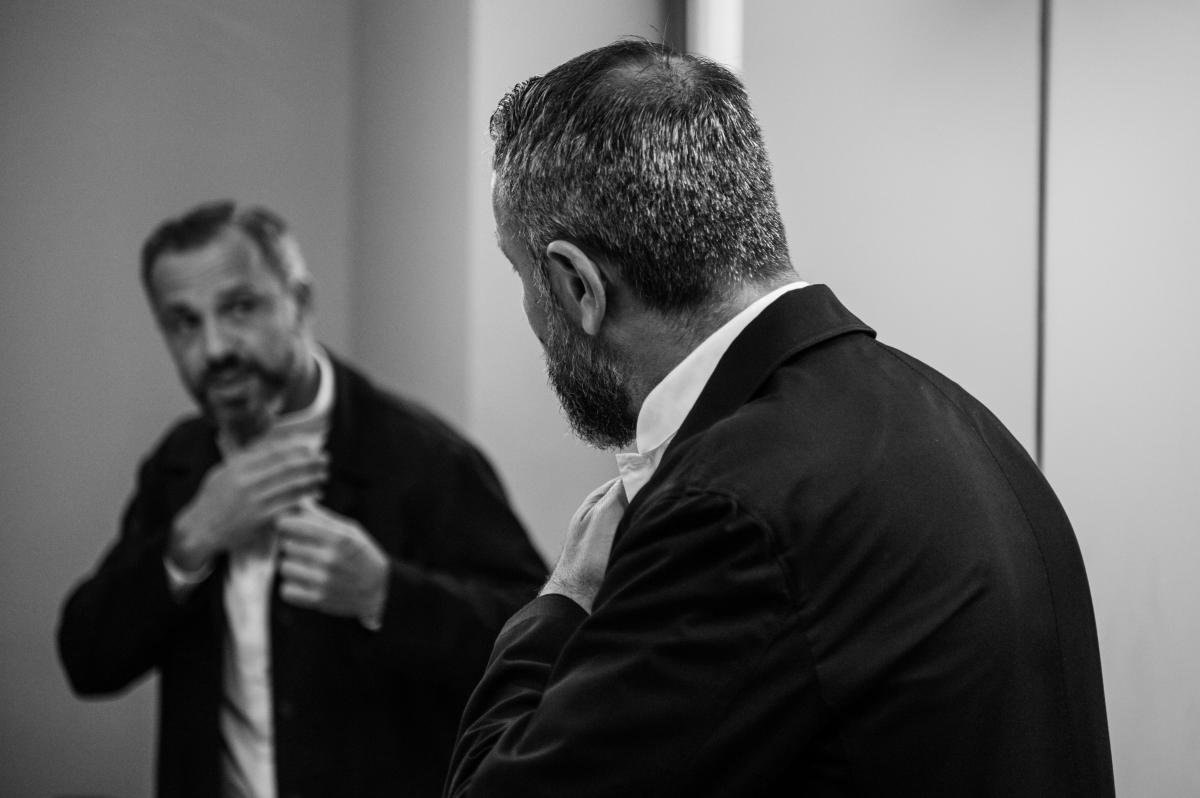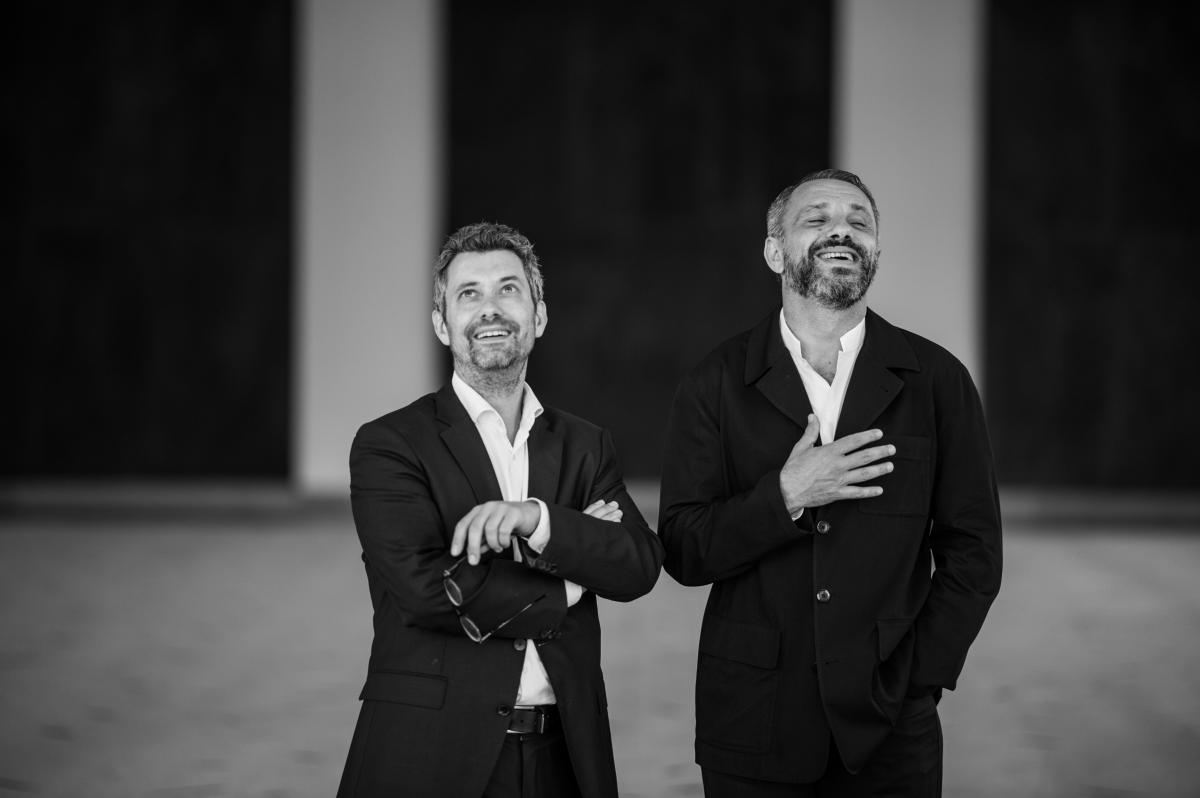Sonate pour l’Orchestre de Pau
C’est au coeur de cette bâtisse, témoin des fastes de la vie mondaine du début du XXe siècle, devenue centre de congrès et casino, que réside l’Orchestre de Pau Pays de Béarn. À sa tête Fayçal Karoui et Frédéric Morando, un binôme qui a presque grandi ensemble. Même regard, même passion, même combat, mêmes valeurs, même empathie pour le genre humain, même acharnement au travail.
De leur pugnacité, complémentarité et amitié harmonieuse, l’Orchestre de Pau est devenu un orchestre de référence. Blossom a voulu écrire sa partition.
C’est à la Belle Époque, côté bar, quʼon les rencontre. Look décontracté, souriants, ces deux-là sont à la musique ce que Pierre et Gilles sont à la photo, Yves Saint-Laurent et Pierre Bergé à la mode ou Pierre et Marie Curie à la science. Depuis leurs études au Conservatoire de Saint-Maur-des-Fossés, au gré de leurs parcours différents, ils ne se sont jamais perdus de vue.
Frédéric, musicien, professeur de violon, enseignant pendant 15 ans, se souvient. « Je suivais les cours de Marie-Claude Theuveny qui rêvait de développer les apprentissages par la pratique collective, la musique de chambre et l’orchestre. Fayçal, lui, était pianiste chez Catherine Collard. » « Une très grande prof de piano, argue Fayçal. Un jour, elle mʼa dit la chose la plus importante de ma vie :
« Le piano ne te donnera pas la carrière que ton caractère attend. Fais de la direction d’orchestre… ».
Catherine Collard avait vu juste. Mais il nʼy avait pas, in situ, de cours pour cela. »
C’est ainsi que Fayçal, à 19 ans, eut l’idée impétueuse de monter un orchestre de chambre avec les copains – une vingtaine a répondu à l’appel – en demandant l’autorisation de répéter dans l’auditorium de Saint-Maur. Jʼavais 17 ans et je trouvais l’idée complètement dingue. Ça a marché un temps jusqu’à ce que le directeur, sans doute par jalousie, arrête cette belle initiative, poursuit Fred. ʼ Fort de cette expérience, le duo monte un festival de jeunes à lʼIle de Ré, fait des trucs incroyables pour jouer un Requiem de Mozart, toujours « à la roots », la passion servant de turbo. Et puis leurs chemins se sont séparés, chacun suivant sa partition pour se retrouver assez vite à Toulouse. Je suis arrivé dans la ville rose pour travailler à l’Orchestre du Capitole, explique Frédéric. Cʼest l’année où Fayçal a eu le prix de direction du Conservatoire de Paris et fut Lauréat du Concours de direction de Besançon. Le troisième cycle lui offrait deux ans à lʼOrchestre National de Toulouse, en tant quʼassistant auprès du chef dʼorchestre Michel Plasson. On sʼest donc recroisés. » Sa passion pour la musique française, Fayçal la doit sûrement à cet homme à la technique rigoureuse et à la poésie permanente de sa direction, mais le futur chevalier des arts et des lettres sent quʼil doit prendre sa liberté et piloter lui-même son propre projet.
En 2007, alors quʼil est à Pau à la demande dʼAndré Labarrère depuis 5 ans, la Fondation Balanchine remarque la qualité de sa direction dans les ballets et sa passion pour la danse. Il devient directeur musical du New-York City ballet pour 7 années merveilleuses. Dans le même temps, il continue son travail de terrain à Pau avec Frédéric qui lʼa rejoint dès 2005. » Je savais que tôt ou tard nous serions amenés à travailler ensemble, car en son absence – Fayçal était entre New York et Pau –, il fallait quelqu’un de musicien dans l’équipe administrative pour s’occuper de la maison ! ».
L’Orchestre de Pau aujourd’hui, c’est 60 musiciens, une équipe administrative et technique de 9 permanents, 2167 abonnés, 6000 scolaires, 60 à 70 concerts par an.
Construire et continuer à construire,
c'est ce que l'on fait ici.
Aussi, il rejoint son ami en 2006 et en devient son directeur artistique. « Jʼhabite ici, je dirige ailleurs, cʼest un cadeau du ciel de bosser avec Fred » souligne Fayçal. « On est très « éponge » plaisante Frédéric. La musique est presque un prétexte dans notre façon de travailler. On l’utilise comme un outil. En créant El Camino, à lʼintersection de la diffusion avec lʼorchestre et de lʼéducatif, nous souhaitions permettre aux enfants de se former aux côtés des musiciens de lʼorchestre. Jʼai enseigné pendant 15 ans, et jʼai été parfois frappé du manque d’initiatives pédagogiques et sociales. Avec Fayçal, on essaie de bousculer les codes et de réinterroger les besoins et les méthodes. » Et Fayçal d’ajouter : « Je dois dire que ce qui m’a construit c’est la légitimité à pouvoir croiser toutes les directions, en amenant lʼorchestre sur tous les terrains et tous les fronts. Je peux facilement, dans une journée, rencontrer un directeur de Total, un animateur de MJC, le Maire et des associations de quartiers, la direction de lʼhôpital et un parent dʼEl Camino. Ces rencontres me permettent dʼadditionner des compétences diverses et complémentaires et de fabriquer ainsi des liens durables et amicaux. Vivre ensemble, pour moi, consiste essentiellement à faire ensemble ! Depuis toujours, j’ai cet appétit de me rendre utile. J’aime les gens, les rencontres. ʼ Engagé, le duo lʼest : auprès de leur public bien sûr mais aussi des étudiants et des enfants des quartiers avec El Camino. « On pense que la culture est au coeur de la vie sociale dʼun citoyen. On a la chance dʼavoir un outil qui nous permet d’agir localement. »
On est jamais
dans la routine
Et les concerts jouent à guichets fermés. Pour en arriver là, il faut choisir des oeuvres qui plaisent et des musiciens de talent. Parmi eux, des jeunes comme Tanguy Gallavardin, 30 ans, clarinettiste solo, bercé par la musique depuis son plus jeune âge : ʻ Mes parents mʼemmenaient voir des concerts, ma soeur jouait du violoncelle… ʼ Conservatoire de Lyon à l’âge de 8 ans, puis à 18 ans, le désir de vivre de sa passion lui apparaît comme une évidence. En 2012, il remporte le premier Prix du concours de Riddes en Suisse. La pratique orchestrale lʼattire. Il intègre l’Orchestre Français des Jeunes en 2011 où il découvre le répertoire symphonique puis est invité à jouer avec l’Orchestre du Capitole de Toulouse, l’Orchestre National de France, l’Opéra de Toulon et l’Orchestre Symphonique de Bretagne. ʻ Cʼest un ami qui a vu une annonce dʼaudition sur Facebook pour lʼOrchestre de Pau. Jʼai passé deux épreuves et jʼai été recruté. Cʼest un orchestre assez familial, basé sur lʼhumain. Et comme nous ne sommes pas recrutés à plein temps, on nʼest pas sur une routine. ʼ Cette idée-là, tous la partagent, même les plus anciens. Karine Léon, altiste, vit à Toulouse, collabore avec la bibliothèque de lʼOrchestre du Capitole et joue depuis une dizaine dʼannées à lʼorchestre : ʻ Ici, il nʼy a pas de tension. On nous donne notre emploi du temps à lʼavance sur l’année. En général, on bloque une semaine par mois. Ce qui nous permet de faire ce que lʼon veut à côté ʼ. Celle qui a commencé le violon à 6 ans puis est passée à lʼalto à 18, connaît bien la maison : ʻ Jʼétais au conservatoire la même année que Fayçal. Cʼest Fred qui mʼa appelée au début de la création de lʼorchestre. Jʼai toujours beaucoup de plaisir à venir les rejoindre. Et jʼai aussi beaucoup de respect pour Laurent Manaud- Pallas, qui donne lʼimpulsion aux cordes et à tout lʼorchestre ʼ.
Violon solo de lʼOrchestre de Pau depuis plus de dix ans, chef dʼattaque des seconds violons de lʼOrchestre National de France, Laurent sévit aussi dans deux autres formations, le Simba Octet et le Quatuor Volta. Son parcours impressionnant lui fait connaître les plus importantes scènes du monde et côtoyer les plus grands chefs dʼorchestre (Daniele Gatti, Kurt Masur, Riccardo Muti…).
La relation avec le public
est primordiale.
Anecdote, sa femme, contrebassiste, sa fille violoniste et son fils percussionniste jouent aussi pour lʼOrchestre. ʻ En dehors de Fred, je suis lʼautre relation très étroite de Fayçal, dit-il en souriant. Sur scène, je suis son bras droit , même si je suis à sa gauche ! ʼ Le violon solo est le musicien le plus important pendant les répétitions et les concerts. Outre son rôle de soliste, il veille sur son pupitre, peut décider des coups dʼarchet sur une partition et exerce une autorité morale, faisant le lien entre les musiciens et le chef. ‘ Je suis un peu le fédérateur de l’orchestre. Les rapports sont fusionnels, parfois conflictuels mais toujours passionnés, l’essentiel est de toujours donner son âme au service de la musique pour entrer dans une relation avec le public ’. Cette relation avec le public est primordiale. Voire même avec les publics.
Séverine Longueville, basson solo à lʼOPPB depuis 15 ans, est aussi professeure de basson à El Camino. ʻ C’est quand même magique de passer d’un orchestre philharmonique à lʼapprentissage de mon instrument pour des enfants défavorisés. De jouer aussi bien dans une crèche que dans une médiathèque, un hôpital ou une prison ! LʼOrchestre de Pau est un orchestre tout terrain, empli de convivialité, dʼéchanges, de musique et dʼamitié, un cocon familial où lʼon se retrouve pour faire de belles choses. ʼ
Même sensation pour Marie Bedat, trompette solo à lʼorchestre depuis 2009, et professeure de trompette à El Camino. ʻ J’ai connu lʼorchestre avant lʼarrivée de Fayçal. Certains musiciens étaient mes profs au conservatoire ! Maintenant je fais le jury ! Fayçal a donné une impulsion « bonne franquette » et cʼest vraiment agréable de pouvoir concilier plusieurs projets ʼ. Parallèlement, Marie, titulaire trompette solo de Scénographe (ex Opéra éclaté), est en train dʼenregistrer un album avec le groupe de musique colombienne ¡Yapunto! et fait partie du groupe de salsa exclusivement féminin Yemaya Banda. Et elle nʼest pas la seule à être éclectique.
L'Orchestre de Pau
est vraiment un orchestre pluriel
Damien Bec, altiste, après plusieurs expériences dʼorchestres, intègre lʼOPPB en 2005 ʻ par l’intermédiaire d’un copain d’un copain ʼ. Quand il nʼest pas sur la scène de lʼOrchestre de Pau (non loin de sa femme, violoniste !), il donne des cours dʼalto à El Camino, joue avec son duo folk Barribal (qui a fait la première partie de Catherine Ringer au Zénith de Pau), effectue des séances dʼenregistrement pour divers artistes (Bruel, Willem…), accompagne Souchon/Voulzy ou Andreas Johnson, part en tournée avec les Fréro Delavega ou travaille sur un projet de musique amérindienne avec un autre ami musicien… ʻ LʼOrchestre de Pau Pays de Béarn est vraiment un orchestre pluriel ! ʼ
Pari réussi donc pour Fayçal Karoui et Frédéric Morando. Le monstre à deux têtes – bien faites et bien pleines – a su sortir l’orchestre classique de son carcan et nous prouver que Jacques Prévert avait raison… L’amour de la musique mène toujours à la musique de l’amour…
Soutenir et contribuer au rayonnement de l’Orchestre de Pau avec le club des Mécènes Concert’O. Merci à tous les Mécènes qui accompagnent l’Orcherstre et ses nombreux projets, accomplissant un travail auusi formidable que précieux.
Le Club des Mécènes de l’Orchestre de Pau
Contact : Laure-Anne Saillard 06 48 16 47 12
Sonata for the PPB Orchestra
In the very heart of this building, which reflects the prosperity of social life in the early 20th century and is now a conference centre and casino – the Pau Pays de Béarn Orchestra has taken up residence. Wielding the baton are Fayçal Karoui and Frédéric Morando, two friends who virtually grew up together. They share the same vision, the same passion; they sing from the same song sheet, they have the same values, the same empathy for people and the same devotion to their work.
Thanks to their determination, complementary personalities and easy-going friendship, the Pau Orchestra has become a model for others, and Blossom has decided to set its story to music.
We meet them in the bar of the Belle Époque brasserie. They’re relaxed and smiling. These two are to music what Pierre and Gilles[1] are to photography, Yves Saint-Laurent and Pierre Bergé to fashion, or Pierre and Marie Curie to science. Since their studies at the Saint-Maur-des-Fossés college of music, and though their respective career paths took them in different directions, they have always stayed in touch.
Frédéric, a musician and violin teacher who taught for over 15 years, thinks back on his student years.
“I was following the classes given by Marie-Claude Theuveny who dreamed of developing the learning process through collective practice, chamber music and the orchestra. Fayçal, was a pianist, under the instruction of Catherine Collard.”
“A truly amazing piano teacher” affirms Fayçal. “I remember one day, she said something that was to be the most important thing in my life:
‘Playing the piano won’t give you the career your personality needs. Conduct an orchestra instead.’
Catherine Collard was right of course, but there weren’t any courses for that on site.”
And that’s how, at 19 years old, Fayçal came up with the impulsive idea of creating a chamber orchestra with his friends – around twenty of them signed up – and requested permission to practise in the Saint-Maur auditorium. Fred continues: “I was 17 and thought the idea was completely mad. It actually worked for a while until the director, probably out of jealousy, put an end to the wonderful initiative.” On the strength of this experience, the two friends created a youth festival on the Ile de Ré, and moved heaven and earth to play Mozart’s Requiem, still on a shoestring budget and driven by their passion and enthusiasm. They then went their separate ways, each following his own score, but they soon met up again in Toulouse. “I ended up there to work in the Capitole Orchestra,” explains Frédéric. It was the year when Fayçal won the Paris Music Academy prize for orchestra conductors and also received an award in the Besançon competition for young conductors. For his post-graduate studies, he spent two years in the Toulouse National Orchestra, as assistant to conductor Michel Plasson. “So our paths crossed again.” Fayçal probably owes his love of French music to this man whose conducting combines rigorous technique with a poetic approach but deep down, the future Knight of the Order of Arts and Letters[2] knew that he had to blaze his own trail and create his own project for himself.
We’re always creating here
In 2007, when Fayçal was in Pau for a five-year period at the request of André Labarrère, the Fondation Balanchine noticed the quality of his conducting in ballets and his passion for the discipline. He became the musical director for the New York City ballet for seven wonderful years and at the same time he continued his work in Pau with Frédéric, who joined him in 2005. “I knew that sooner or later we would end up working together, because in his absence – Fayçal was shuttling between New York and Pau – the administrative team needed a musician to keep the show on the road!”
And so the two friends were reunited again in 2006, and Fred became his artistic director. “I live here and I conduct elsewhere, it’s a real godsend to work with Fred,” Fayçal says earnestly. “We’re each other’s muse,” says Frédéric jokingly.
“Music is almost a pretext in the way we work together. We use it as a tool.
When we created El Camino, an association to share musical culture at the meeting point between the orchestra and an educational project, we wanted to give children the opportunity to learn alongside orchestral musicians. I taught for 15 years and was sometimes amazed at the lack of instructional and social initiatives. Fayçal and I try to shake up the established codes and take a fresh look at needs and methods.” Fayçal adds: “I have to admit that what was really character-building for me was having the legitimacy to be able to meet people from all walks of life, by taking the orchestra to perform in all kinds of environments. In the space of a day, I can quite easily come across a manager from Total, an MJC[3] events organizer, the Mayor and neighbourhood associations, the board of directors from a hospital or a parent from El Camino. These different encounters help me acquire different and complementary skills and to forge long-term relationships and friendships. For me, living together essentially means doing things together!
I’ve always had a need to make myself useful. I like people, I like meeting people.”
There’s no doubt about it, the pair is definitely committed to their public of course, but also to neighbourhood students and children through the El Camino initiative. “We consider culture to be the core of a citizen’s social life, and we’re lucky enough to have a tool that enables us to act on this at a local level.”
There’s nothing routine in what we do
Today the Pau Orchestra comprises 60 musicians, an administrative and technical team of 9 permanent staff, has 2,167 subscribers, involves 6,000 pupils and students and puts on 60 to 70 concerts every year.
The concerts are always a sell-out, and achieving such popularity means selecting pieces of music that people enjoy and choosing talented musicians. Among them are young virtuosos like Tanguy Gallavardin, a 30 year-old solo clarinettist, who has been surrounded by music since his early childhood: “My parents took me to concerts, my sister played the cello.” He attended the Lyon Music Academy at 8 years old and when he turned 18, making a living from what really inspired him seemed the natural thing to do. In 2012 he won first prize in the music competition in Riddes, Switzerland. Playing in an orchestra appealed to him and he joined the French Youth Orchestra in 2011 where he discovered the symphonic repertoire and was later invited to play with the Toulouse Capitole Orchestra, the French National Symphony Orchestra, the Toulon Opéra and the Brittany Symphony Orchestra successively. “One of my friends saw a post on Facebook for auditions for the Pau Orchestra. I went through two selection phases and after that, they hired me. It’s a people-focused orchestra with a family atmosphere, and as we are not hired full-time, we never work to a routine.” All the musicians share his opinion, even the most long-standing members. Karine Léon, a viola player, lives in Toulouse, works in liaison with the Capitol Orchestra library and has been playing in the Orchestra itself for about ten years: “There’s no tension here. We get our timetables well in advance for the year ahead, and in general, we reserve one week every month, which means that we can do what we want with our time outside that.” Karine, who began playing the violin when she was six years old, then went on to the viola when she was eighteen, knows the orchestra well: “I was at the music academy in the same year as Fayçal. Fred contacted me when the orchestra was being created and it’s always a real pleasure to come and join them. I also have a lot of respect for Laurent Manaud-Pallas, who really motivates the string section and gives impetus to the entire orchestra.”
Solo violinist in the Pau Orchestra for over a decade and principal second violin in the French National Orchestra, Laurent has two other strings to his bow: the Simba Octet and the Volta Quartet. His impressive career path led him to play in some of the world’s most famous concert halls and meet the greatest conductors (Daniele Gatti, Kurt Masur, Riccardo Muti, etc.).
The relationship with the audience is crucial
Just by-the-by, his wife, a bass player, his daughter, who plays the violin, and his son, who is a percussionist, also play in the Orchestra. “I’m almost as close to Fayçal as Fred is,” Laurent says smiling. “On stage, I’m his right-hand man, even though I sit to his left!” The first violinist is the most important musician during practice sessions and concerts. In addition to his role as a soloist, he has to keep an eye on his sheet music, can decide on which type of bowing will be used for a given score and has a certain moral authority, as the go-between for the musicians and the conductor.
“I suppose I’m really the one who brings the orchestra together. Relationships are intense which means sometimes sparks fly, but they are always founded on the same passion – the key thing is to always put your heart and soul into the music so that you connect with the audience.” It’s a crucial relationship for an orchestra.
Séverine Longueville, solo bassoonist with the OPPB for fifteen years now, is also a bassoon teacher at El Camino. “There’s something magical about switching from a philharmonic orchestra to teaching underprivileged children to play the bassoon, to be able to play in a crèche, a media library, a hospital or a prison! The Pau Orchestra is multifaceted orchestra, full of conviviality, sharing, music and friendship, a family cocoon where we all gather together to create something beautiful.”
Marie Bedat, solo trumpet with the orchestra since 2009 and a trumpet teacher at El Camino, feels exactly the same way. “I knew the orchestra before Fayçal arrived. Some of the musicians were my teachers at the music academy, but now I’m on the other side of the fence! Fayçal gave a no frills impetus to the orchestra and it’s really nice to be able to run several projects at once.” Alongside that, Marie is the lead trumpet for Scénographe (formerly the Opéra group), is currently recording an album with Yaputo, a Columbian music group and is part of the all-female salsa group Yemaya Banda. And she’s not the only one to be plate-spinning.
The Pau Orchestra is a truly versatile orchestra
Damien Bec, a viola player, joined the OPPB in 2005 after several orchestral experiences “thanks to the friend of a friend.” When he’s not on stage with the Pau Orchestra (sitting close to his wife, a violinist!), he gives viola lessons at El Camino, plays in his folk duet Barribal (who played the opening act for Catherine Ringer at the Zénith concert hall in Pau), runs recording sessions for different artists (Bruel and Willem among others), accompanies Souchon/Voulzy or Andreas Johnson, goes on tour with the Fréro Delavega or works on an indigenous American music project with another friend and musician. “The Pau Pays de Béarn Orchestra is a truly versatile orchestra!” So the gamble has paid off for Fayçal Karoui and Frédéric Morando.
This marriage of two keen and creative minds has succeeded in letting the classical orchestra out of its gilded cage and proving to everyone that French poet Jacques Prévert was right: “Love of music always leads to the music of love.”
[1] https://en.wikipedia.org/wiki/Pierre_et_Gilles
[2] L’Ordre des Arts et des Lettres is an Order of France created by the Minister of Culture on 2 May 1957. Its main purpose is to give recognition to major contributions to the arts or literature.
[3] Maison des Jeunes et de la Culture – French Youth & Cultural Centres
BLOSSOM #06
Visite privée
Sonate pour l’Orchestre
Rédaction : Catherine NERSON
Photographe : Jean-Michel DUCASSE
ORCHESTRE DE PAU PAYS DE BÉARN (OPPB)
Pavillon des Arts (sous la station haute du funiculaire, 1 Place Royale 64000 PAU
05 59 80 21 30
www.oppb.fr


